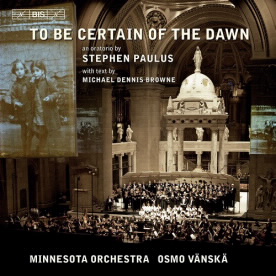Stephen Paulus was born in 1949. His recording, To Be Certain of the Dawn, was composed at the invitation of Minnesota Orchestra and The Basilica of St. Mary. The recording celebrates the 60th anniversary of the liberation of the Nazi death camps and the 40th anniversary of the publication of Nostra Aetate (Latin for “In Our Times”), the seminal Vatican II document that condemned blaming Jews for the death of Christ.

How is this piece different from the works you composed in the past?
It is probably the longest work for chorus and orchestra that I have written. It is the only one with 4 soloists and a cantor and it also is the only one to deal with a serious social and political subject
What was the creative process like? Did you face any challenges composing this?
The inspiration for this work comes from the serious nature of the subject matter and the words of Michael Dennis Browne. He and I are long-time collaborators and have a wonderful way of working together. This project was no different from the other 15 or so that we have co-authored. One of the challenges was to say something new about the subject and to do it with sensitivity and skill.
Why did you name sections of your work as Renewal, Remembrance and Visions?
The names for the 3 major sections (I. Returning, II. Renewal and III. Remembrance) grew out of my decision to group the work into three major concepts. I felt strongly that people would be able to get their ears around the subject more easily if the many disparate little sections were grouped under major headings. I think it does work.
Can we talk about the significance of using music to mourn the victims of the Holocaust, from your point of view?
Music has so much power to move, to inspire and to create real change. It has the ability to make words more powerful in their content and delivery. It measures and metes words out at a pace determined by the composer who can at least attempt to calculate their effect.
Review of To Be Certain of the Dawn:
Vatican-Jewish relations have been full of tension for years. The latest debacle in this relationship was caused by Briton Richard Williamson, a member of the extremely conservative Society of Saint Pius X. Williamson has denied the existence of the Holocaust, something the current Pope failed to remember when he lifted his excommunication.
Yet there have been reconciliatory efforts between Jews and Catholics. The newest area of reconciliation is music. The work of Stephen Paulus, performed by the Minnesota Orchestra and its chorus, is the latest example of how Catholics and Jews can share their celebration of the Vatican reform in 1968 and the liberation of Nazi Death Camps in 1948.
To Be Certain of the Dawn is a work in three sections, with a great arrangement between the soloists and the chorus. The chorus is able to recreate the atmosphere of blindness and ignorance towards the sufferings of Jews during the Second World War. In the “Vision” section in particular, the chorus does a wonderful job of outlining both the sorrow and hope of people tortured and killed in the Holocaust.
The most important aspect of this work is the reminder that music is the common language of humanity. It creates a new atmosphere, bringing more clarity than simple rhetoric. Actions may speak louder than words, but music can give actions more profound depth – and this production is a testament to the latter.
